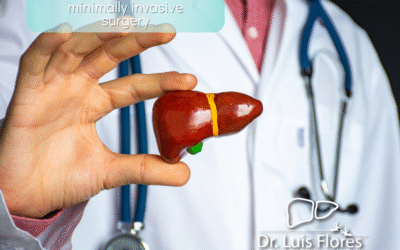Introduction
Benign liver tumors are a common condition that can affect people of various ages. Although the word “tumor” can sound alarming, it is important to emphasize that benign tumors are not cancerous and, in many cases, do not pose a significant health risk. This article, directed at the patients of Dr. Luis Flores, a general and digestive surgeon in the city of Cuenca, aims to provide a detailed understanding of benign liver tumors, their types, symptoms, causes, diagnostic methods, and treatment options. More information here!!
Types and Categories
Hemangiomas
Hemangiomas are the most common type of benign liver tumors. These tumors are made up of a mass of abnormal blood vessels and typically do not cause symptoms. Most hemangiomas are detected incidentally during imaging studies performed for other reasons.
Hepatic Adenomas
Hepatic adenomas are benign tumors that develop in liver cells. Although they are usually asymptomatic, they can cause abdominal pain or discomfort if they grow large enough. These tumors are most commonly associated with the use of oral contraceptives and certain anabolic steroids.
Symptoms and Signs
Abdominal Pain
Abdominal pain is one of the most common symptoms associated with benign liver tumors, especially if the tumor is large or positioned in a way that affects other organs. The pain can range from mild to severe and is usually located in the upper right part of the abdomen.
Fullness Sensation
A feeling of fullness or abdominal distension can occur when a benign liver tumor grows large enough to put pressure on the stomach or intestines. This can lead to decreased appetite and unintentional weight loss.
Causes and Risk Factors
Hormonal Factors
Hormonal levels, particularly estrogen, play a crucial role in the development of some benign liver tumors, such as hepatic adenomas. Women who take oral contraceptives or hormone therapy are at higher risk of developing these tumors.
Genetic Factors
In some cases, genetic factors may influence the predisposition to developing benign liver tumors. People with a family history of liver diseases may be at higher risk.
Diagnosis and Tests
Abdominal Ultrasound
Ultrasound is a non-invasive and effective diagnostic tool for detecting benign liver tumors. It uses sound waves to create detailed images of the liver, allowing doctors to identify the presence and characteristics of the tumors.
Computed Tomography (CT) and Magnetic Resonance Imaging (MRI)
CT and MRI are advanced imaging techniques that provide a detailed view of the liver and its structures. These tests are useful for assessing the size, location, and nature of benign tumors and for differentiating between benign and malignant tumors.
Treatment Options
Observation and Monitoring
In many cases, benign liver tumors do not require treatment and are simply monitored regularly to detect any changes in size or characteristics. This is especially true for small, asymptomatic hemangiomas.
Surgery
If a benign liver tumor causes significant symptoms, grows rapidly, or presents a risk of rupture, surgical removal may be necessary. Surgery may involve partial liver resection to remove the tumor and ensure long-term liver health.
Preventive Measures
Healthy Lifestyle
Maintaining a healthy lifestyle, including a balanced diet, regular exercise, and avoiding excessive alcohol consumption, can help reduce the risk of developing benign liver tumors and maintain overall liver health.
Hormonal Control
For women using oral contraceptives or hormone therapy, it is important to have regular medical check-ups to assess any potential impact on liver health. Discussing alternatives with a doctor can be beneficial for reducing risk.
Expert Insights
Dr. Luis Flores
Dr. Luis Flores emphasizes the importance of early detection and proper management of benign liver tumors. He recommends his patients undergo regular imaging studies and maintain open communication with their doctor about any new or persistent symptoms.

Conclusion
In summary, benign liver tumors are a common condition that generally does not pose a significant health risk. However, it is crucial to be aware of the symptoms and undergo regular check-ups to ensure proper detection and management. If you experience symptoms related to benign liver tumors, seek medical attention and discuss the best treatment options with a trusted professional like Dr. Luis Flores in Cuenca.





